现代大学英语精读第3册lesson 1课件
- 格式:ppt
- 大小:2.01 MB
- 文档页数:41
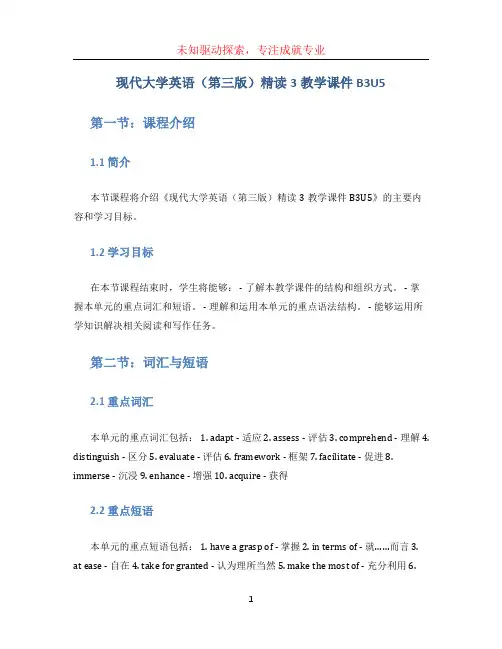
现代大学英语(第三版)精读3教学课件B3U5 第一节:课程介绍1.1 简介本节课程将介绍《现代大学英语(第三版)精读3教学课件B3U5》的主要内容和学习目标。
1.2 学习目标在本节课程结束时,学生将能够: - 了解本教学课件的结构和组织方式。
- 掌握本单元的重点词汇和短语。
- 理解和运用本单元的重点语法结构。
- 能够运用所学知识解决相关阅读和写作任务。
第二节:词汇与短语2.1 重点词汇本单元的重点词汇包括: 1. adapt - 适应 2. assess - 评估 3. comprehend - 理解 4. distinguish - 区分 5. evaluate - 评估 6. framework - 框架 7. facilitate - 促进 8. immerse - 沉浸 9. enhance - 增强 10. acquire - 获得2.2 重点短语本单元的重点短语包括: 1. have a grasp of - 掌握 2. in terms of - 就……而言 3. at ease - 自在 4. take for granted - 认为理所当然 5. make the most of - 充分利用 6.be unaware of - 不知道 7. be exposed to - 接触到 8. fall behind - 落后 9. go beyond - 超越 10. be equipped with - 装备有第三节:语法结构3.1 主动语态和被动语态本单元将重点介绍主动语态和被动语态的用法。
主动语态表示主语是动作的执行者,而被动语态表示主语是动作的承受者。
3.1.1 主动语态主动语态的结构为:主语 + 动词 + 宾语。
3.1.2 被动语态被动语态的结构为:宾语 + be动词 + 过去分词 + by + 主语。
3.2 直接引语和间接引语本单元还将介绍直接引语和间接引语的用法。
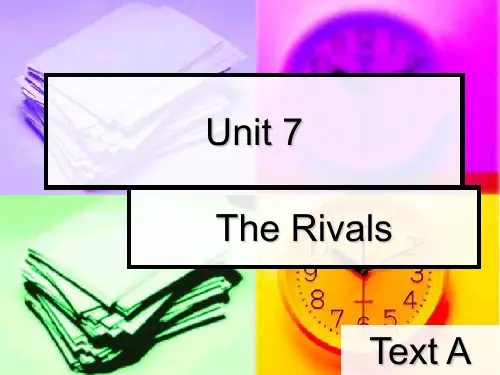
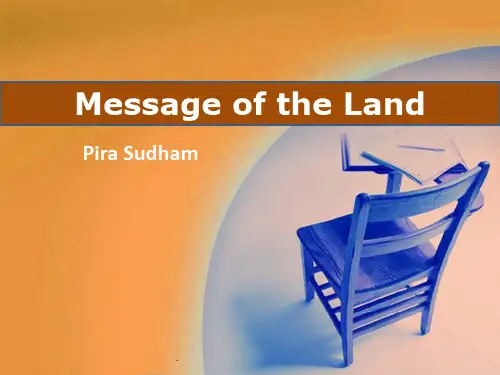


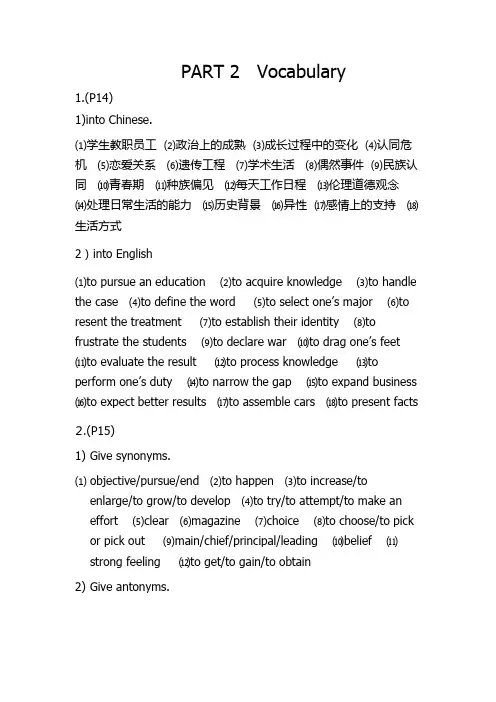
PART 2 Vocabulary1.(P14)1)into Chinese.⑴学生教职员工⑵政治上的成熟⑶成长过程中的变化⑷认同危机⑸恋爱关系⑹遗传工程⑺学术生活⑻偶然事件⑼民族认同⑽青春期⑾种族偏见⑿每天工作日程⒀伦理道德观念⒁处理日常生活的能力⒂历史背景⒃异性⒄感情上的支持⒅生活方式2)into English⑴to pursue an education ⑵to acquire knowledge ⑶to handle the case ⑷to define the word ⑸to select one’s major ⑹to resent the treatment ⑺to establish their identity ⑻to frustrate the students ⑼to declare war ⑽to drag one’s feet ⑾to evaluate the result ⑿to process knowledge ⒀to perform one’s duty ⒁to narrow the gap ⒂to expand business ⒃to expect better results ⒄to assemble cars ⒅to present facts⒉(P15)1)Give synonyms.⑴objective/pursue/end ⑵to happen ⑶to increase/toenlarge/to grow/to develop ⑷to try/to attempt/to make aneffort ⑸clear ⑹magazine ⑺choice ⑻to choose/to pick or pick out ⑼main/chief/principal/leading ⑽belief ⑾strong feeling ⑿to get/to gain/to obtain2)Give antonyms.⑴masculine ⑵immature ⑶independence ⑷inferior ⑸incompetent ⑹minor ⑺to narrow ⑻innocence ⑼to exclude ⑽disapproval ⑾mistrust/distrust ⑿inequality ⒀to discourage ⒁to grow/to increase/toexpand/to develop ⒂indistinct/unclear/vague ⒃impractical/unpractical/theoretical⒊(P15)1)handle 2)occurrence 3)handle 4)involved5)observant/occurrence 6)observation/observed/occur 7) involve 8) application 9)occurred/apply10)observers/handled 11)involvement 12)observation⒋(P16)⑴She intends to apply for that academic position.⑵He is so devoted to his research that idea that he willsoon have to retire never occurs to him.⑶Many people have observed that , without effectivechecks, we have a tendency to abuse our power.⑷Students must observe carefully how good writers usewords.⑸Some countries refuse to get involved in this dispute andthey resent any foreign interference.⑹How do you think we should handle the drug problem?⑺According to the agreement, all business policies apply toeverybody without any prejudice.⑻The control of the and storms will involve a tremendousamount of work and money.⑼You have to take into consideration the local conditionwhen you apply these technologies.⑽All applicants will have to fill out this form and mail in an application fee of 50 dollars.⑾Based on his careful observation of children’s behavior he came to the conclusion that learning is a naturalpleasure.⑿In a country of many nationailities, ethnic harmony requires very careful handling.⒀The government is determined to punish all the corrupt officials involved.⒁Cheating at exams dose not occur very often. But when it dose, the school takes a very tough position.5.(P16)⑴C ⑵A ⑶B ⑷A/D ⑸B ⑹D ⑺D ⑻A ⑼B ⑽C⑾A ⑿C ⒀D ⒁A ⒂B ⒃D ⒄A ⒅D6.(P18)1)⑴object ⑵objective ⑶objective ⑷objective ⑸objects2)⑴requires ⑵requires ⑶acquire ⑷acquire ⑸inquire3)⑴entrusted ⑵entrusted ⑶trust ⑷believe ⑸trust4)⑴repaid ⑵pay,repay ⑶place ⑷repay ⑸placed,replaced5)⑴anxious ⑵anxiously ⑶eager ⑷eager/anxious ⑸eager/anxious7.(P19)⑴suggested ⑵primarily ⑶told ⑷but ⑸remained ⑹consisted ⑺eventually ⑻regrets ⑼pursuing ⑽what ⑾where ⑿Although ⒀derive ⒁lacking ⒂droppingPART 3 Grammar⒈(P20)1)them: pronoun2)who they are and what their strengths and weaknesses are:two wh-clauses3)to enter the work world: an infinitive phrase4)that there are four distinct aspects to psychological separationform one’s parents: a that-clause5)where they are in the independence/dependence struggle: awh-clause6)how to give and receive affection in the adult word: a wh-clause7)very little: pronoun8)how they react to new knowledge and new ways of learning,how they process the knowledge presented to them, and how they organize this knowledge: three wh-clause9)shuddering: a gerund10)drifting down: a gerund phrase11)herself: a reflective pronoun12)how to let loose a plague capable of destroying wholenations: wh-word + to-infinitive13)what to say: wh-word + to infinitive14)whether it had been storming for three or four days: a nounclause introduced by “whether”15)(need) charity: a noun; (help) themselves: a reflexivepronoun; (told) Millard: a proper noun2.(P)1)Complete the sentences with one appropriate word.⑴what ⑵yourself ⑶what ⑷whether ⑸it ⑹others ⑺why ⑻which/how ⑼everything ⑽much3)Choose the right form.⑴feeling ⑵to change ⑶becoming ⑷being; being/to be⑸to go ⑹thinking ⑺to stay ⑻not to see ⑼havingfallen behind ⑽being recongnized4)Translate.⑴In the negotiations, the two sides found they had little incommon.⑵More and more old people are learning how to surf/use theInternet.⑶Don’t forget to write down your name on the exam paper.⑷We must bear in mind that there is no shortcut in learning.⑸He never regretted having shifted from business to politics.⑹I’d like to have a chat with you about your term papersometime this week.⑺Like sports, learning a foreign language requires a lot ofpractice.⑻They all remember where they were when they heard theshocking news.⑼People learn little from victory, but much more from defeat.⑽Whenever you face a decision you have three choice: do what you please; do what others do; or do what is right.3.(P22)1),6)the way + clause = the way in which + clause2),3),8)a way/the way(s) + to-infinitive phrase (referring toan activity in a specific way)4),5),7)a way/the way(s) + of + gerund noun (referring to anactivity in a general way)But in many cases, the difference between “a/the way to do sth.” and “a/the way of doing sth.” is blurred. The choice israther a matter of idiomatic usage.4.(P22)⑴a poet’s way of telling us ⑵the only way to learn a foreign language well ⑶no easy way to say good-bye ⑷the way they all stared at me ⑸some aspects of the way we speak ⑹(many) ways to get data into a computer ⑺The way I judge it ⑻a way of delivering the secret message ⑼a way to stop the leak ⑽the way the children responded to their questions5.(P23)a, this, a, this, an, The, the/a, a, the, the, The, the, /, The, his, the, the6.(P23)⑴D ⑵C ⑶A ⑷D ⑸B ⑹D ⑺A ⑻B ⑼D ⑽B ⑾C ⑿B ⒀A ⒁C ⒂AWRITTEN WORKIn that way, according to the writer of the article, is college a time of growth and expansion?College life is an important period in one’s life. Although the college students seldom think about that the key changes will probably happen to them during their college years.During this time, students are going through an identity crisis which includes independence/dependence struggle from their parents. And also, the most important thing is establishing their sexual identity. At the same time, these youngsters are learning how to give and receive affection in the adult word. What’s more, they establish their personal and social identity. They are a affirming their personal values such as religious faith, moral and ethical values and developing new ways to organize and using the academic knowledge as well as their world knowledge.In a word, college students can be growing in their understanding of themselves, others and world in which they lives.。
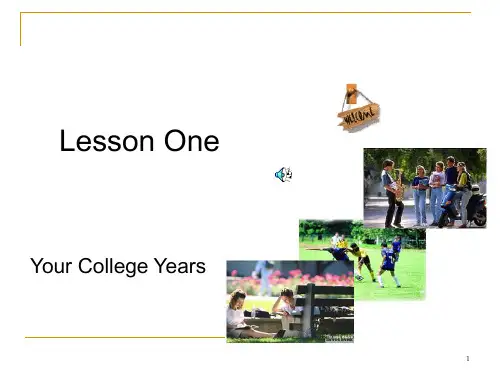
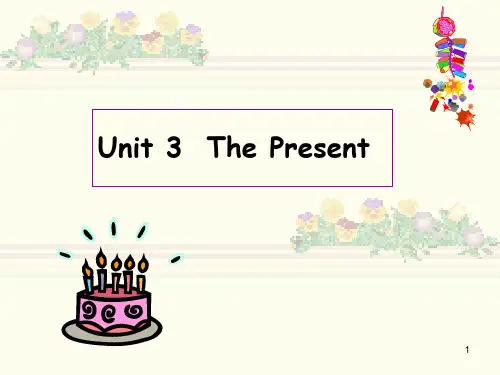
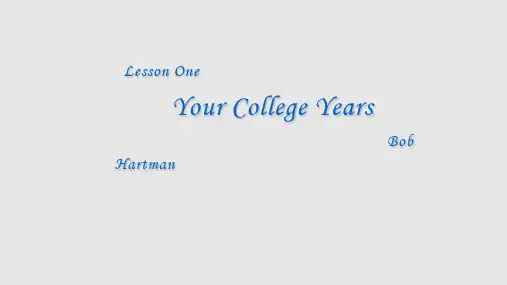

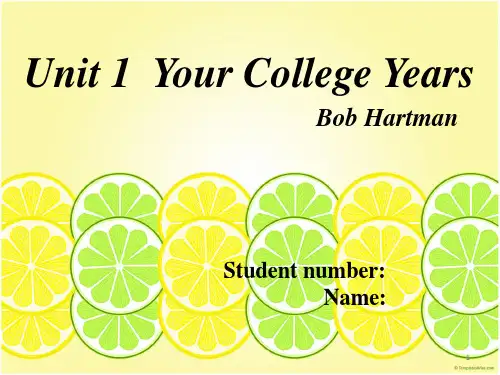
Lesson One Your College YearsI. Teaching Objectives:After learning this unit, students are supposed to:1)get familiar with some grammatical points;2)get to know what college is designed to be3)get a list of the new words and expressions and be able to use them freely in writing and daily conversation;4) have a thorough understanding of the whole text:Your College Years5) retell the text as a wholeII.Listening and speaking activities1.Listen to the recording of the text and fill in the blanks about the main ideas of the article.2.Talk about the purpose of your college years.III. Reading Comprehension and Language Activities1. Pre-reading discussions:1)Being a college student for more than one year, have you realized your changes?What are they?2)What’s your opinion about the purpose of a college?•Identity Crisis (认同危机)•A) A psychosocial state or condition of disorientation and role confusion occurring especially in adolescents as a result of conflicting internal and external experiences ,pressures, and expectations and often producing acute anxiety . •B) An analogous state of confusion occurring in a social structure , such as an institution or a corporation.•Southwestern Baptist Theological Seminary•Southwestern Baptist Theological Seminary, located in Fort Worth , Texas ,is a private ,non-profit institution of higher learning associated with Southern Baptist convention whose stated mission is “to provide theological education for individuals engaging in Christian ministry .”It is one of the largest seminaries in the world and is credited by the Associations of Theological schools and also by the Southern Association of Colleges and Schools toward diploma, masters and doctoral degrees. The school uses the Baptist and Message as its confession of faith .3. About the text:It’s about the author’s idea towards the college years. It can be divided into six parts:Part 1 (para.1) Introduction: College students will go through key changes in their college years.Part 2 (Para. 2-6) Establishment of college students’ personal sexual and social identity in the college.Part3 (para.7) Affirmation of personal values such as religious faith, their values, and theirmorals.Part 4 (para.8 ) Development of new ways to organize and use knowledge.Part 5(para.9) Expansion of their world knowledge.Part 6 (para.10) Summary: College students are growing in their understanding of themselves, others and the world in which they live.4. Language points1) Words and expressionsto handle(1)to turn, to lift or turn with the handsThis box contains delicate china .Please handle with care .(2)to operate with handsThis computer is easy to handle .(3)to manage control or cope withThank you . But I can handle it myself .handle n. 把,柄This knife has a carved handle.to apply(1)to make a formal and usually written request for a job , position , permission etcShe is applying for a scholarship(2)to use a method , law ,principle etc in a particular situation(3)applicant n. the one who appliese.g. We should apply this theory to practice.(4)to affect or concern somebody or somethingNot all natural laws can apply to human society .(5)to bring something into nearness or contact with somethingApply some of this ointment to the swollen part ,and the pain will soon be gone .application n.2). Grammatical structure•I knew we had them licked.•She’d never say a word about all the weeks he’d been away, not leaving us a cent for food.•I found myself seeing my father in a different way and relating to him as a friend whom I could encourage.•It seemed to me then that he was always showing off.5. Post-reading discussion:What are your goals for the college years?。
一、教学目标1. 知识目标:(1)掌握课文中的重点词汇、短语和句型;(2)了解英语学习策略;(3)理解课文内容,提高阅读理解能力。
2. 能力目标:(1)提高学生的英语听说读写能力;(2)培养学生运用英语进行交流的能力;(3)提高学生的自主学习能力。
3. 情感目标:(1)激发学生对英语学习的兴趣;(2)培养学生良好的学习习惯;(3)增强学生的自信心。
二、教学重点与难点1. 教学重点:(1)课文中的重点词汇、短语和句型;(2)英语学习策略;(3)课文内容的理解。
2. 教学难点:(1)英语学习策略的运用;(2)课文内容的理解与感悟。
三、教学过程1. 导入新课(1)教师简要介绍英语在国际交流中的重要性;(2)提出本节课的学习目标,激发学生的学习兴趣。
2. 预习课文(1)学生快速浏览课文,了解文章大意;(2)教师提问,检查学生对课文内容的初步理解。
3. 课文精讲(1)教师讲解课文中的重点词汇、短语和句型,并举例说明;(2)分析课文结构,引导学生理解文章大意;(3)讲解英语学习策略,并结合实例进行讲解。
4. 课堂练习(1)学生进行单词拼写、翻译和句型转换练习;(2)教师点评学生的练习,纠正错误。
5. 课堂讨论(1)教师引导学生讨论课文内容,分享自己的学习心得;(2)组织学生进行小组讨论,培养学生的合作意识。
6. 课堂小结(1)教师对本节课的内容进行总结,强调重点和难点;(2)布置课后作业,巩固所学知识。
四、课后作业1. 复习课文,熟记重点词汇、短语和句型;2. 完成课后练习题;3. 撰写一篇关于英语学习策略的短文,分享自己的学习经验。
五、教学反思本节课通过讲解课文、讲解英语学习策略、课堂练习和讨论等形式,帮助学生掌握课文内容,提高阅读理解能力。
在教学过程中,教师应注重激发学生的学习兴趣,培养学生的自主学习能力,提高学生的英语综合运用能力。
同时,教师应关注学生的学习反馈,及时调整教学策略,确保教学效果。